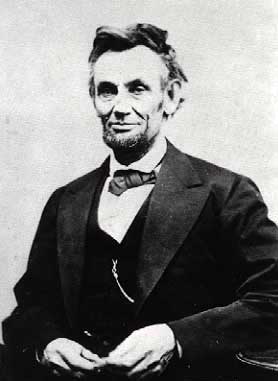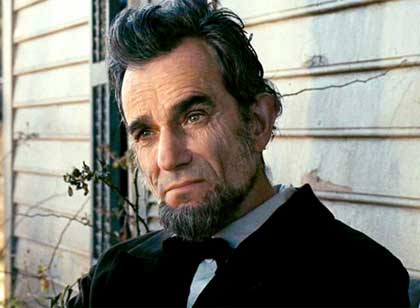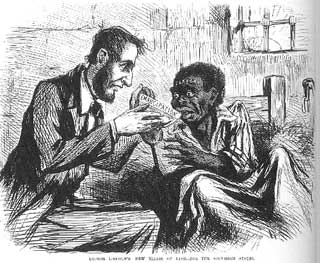Film (2012)
Directed by Steven Spielberg
Screenplay by Tony Kushner
based in part on Team of Rivals: The Political Genius of Abraham Lincoln by Doris Kearns Goodwin
Director of Photography: Janusz Kaminski, Film Editing: Michael Kahn
With Daniel Day-Lewis (Abraham Lincoln), Sally Field (Mary Todd Lincoln), David Strathairn (William Seward), Joseph Gordon-Levitt (Robert Lincoln), James Spader (W.N. Bilbo), Hal Holbrook (Preston Blair), Tommy Lee Jones (Thaddeus Stevens), John Hawkes (Robert Latham), Jackie Earle Haley (Alexander Stephens), Bruce McGill (Edwin Stanton), Tim Blake Nelson (Richard Schell), Joseph Cross (John Hay), Jared Harris (Ulysses S. Grant), Lee Pace (Fernando Wood), Peter McRobbie (George Pendleton), Gulliver McGrath (Tad Lincoln), Gloria Reuben (Elizabeth Keckley)

The Civil War is nearing its end and that, ironically, holds some danger for the passage of an amendment to end slavery. The Senate has passed the amendment, but its fate still hangs in the balance in the House of Representatives. If Congress gets wind that the war is winding down, they may hesitate to act on it. Of course, everyone wants an end to the war, but Lincoln, a cagey politician as well as an inspired leader, understands that the amendment needs to be passed before it does end – otherwise, input from a reincorporated South is likely to doom it.

Photo: Dreamworks SKG Studios
Daniel Day-Lewis is an amazing Lincoln. He embodies the role with such grandeur and grace and the result is truly remarkable. I was not as fond of his portrayal of the driven capitalist protagonist in Paul Thomas Anderson’s There Will Be Blood (2007), which, along with the rest of the movie, struck me as overdone. Here, however, he gives a stellar performance, both moving and inspiring. With a whole array of subtle gestures and stances he captures the many-sided poetry of Lincoln’s disposition – as storyteller, orator, husband and father, and, here most vividly, as politician.
It is in conveying that role as politician that the great strengths of the film reveal themselves. One does not always think first of Lincoln’s capacities as a political engineer, but, as this film deftly illustrates, he was indeed very much that. Carefully weaving a view of Lincoln’s idealistic vision with his steely will and capacity for deft political maneuvering, the film conveys a complex portrait.
The script is dedicated to showing the details of that maneuvering, and, if one pays careful attention, one comes away from the film appreciating the many subtleties of the politics involved.

Photo: Dreamworks SKG Studios
Tommy Lee Jones gives a very fine performance as Thaddeus Stevens, the hard-boiled idealistic legislator whose navigation within the House of Representatives finally helped ensure the passage of the amendment. Jones’ Stevens has a solemn, determined, hard-boiled, no-nonsense gaze that we know well from his other performances. Mixed with a hobbled gait driven by sheer will, that resolute gaze contributes to a wonderful depiction of a determined idealist whose capitulation to political realism finally enables revolutionary change.

While acknowledging these great performances, I found this film not quite as enthralling as I expected I would. It is incredibly wordy and its tone is generally so uniform that it feels frequently like watching a historically retrofitted version of C-Span.
As I made my way through it, I thought that this seemed very much like a West Wing episode in its detailed depiction of all the political subtleties involved, but slowed way down. The West Wing always ran Aaron Sorkin’s streams of verbiage at 78 rpms, while Lincoln delivers Tony Kushner’s at 33 1⁄3.
Kushner, who became famous as the author of the very long, highly acclaimed, two part play, Angels in America (1993), is an interesting writer, but not a particularly economical one. For my money, Angels in America could well have been edited way down and made into a far better play. That is not to say that it is uninteresting or uncompelling; it is. But it suffers from word and scene bloat, and could benefit from considerable tightening.
The same could be said of this screenplay. It illuminates the political problems very well, but, as a dramatic film, it does not work quite as well. Much of the film is about gathering needed votes in the House, and the big, climactic scene is the one in which the votes get cast.
It is interesting in the long run, but I am not sure, especially for a film so generically titled as Lincoln, that so much focus on these particular details is the way to go. With that big title and the expectation of getting a film more about Lincoln himself, this was not quite what one would have expected.

Though director Steven Spielberg has done a pretty good job, the pacing is less dramatic than it might be. He seems happy presenting the equivalent of a courtroom drama here, but it does not really bring out his best side as a director. His great capacities exhibit themselves best in films that demonstrate action more forcefully. Even in Spielberg’s compelling Amistad (1997), much of which takes place in a courtroom, there is a greater sense of dramatic action. Here, Kushner’s interesting but wordy script makes that more difficult, and Spielberg’s direction seems to comply with, rather than vary, its approach.
Throughout his oeuvre, Spielberg has had a tendency to wander from tenderness into sentimentality. Sometimes it works ok, but when that occurs in Lincoln ,the mixture with the abundance of verbiage about detailed political process is particularly odd. And, to that strange mixture, when he adds scenes of horrible brutality from the war, this too feels strangely overdone and tonally incoherent.
Other actors – Sally Field (Mary Lincoln), David Strathairn (William Seward), Hal Holbrook (Preston Blair) and a string of others, do a creditable job, though Daniel Day-Lewis and Tommy Lee Jones stand well out from the crowd.
Rewarding and interesting in many ways, this film requires concentration to follow the subtleties of its script. Very worthwhile, it gives a vivid sense of how this vitally important legislation got made. And, thanks to Daniel Day-Lewis’ stunning portrayal, the heartfelt dramatization of the great political hero’s life also comes through.
– BADMan
Leave a Reply